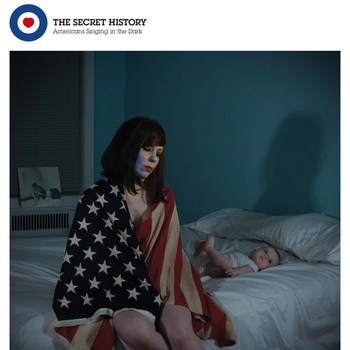Written by: Dave Cantrell
Lately I’ve found myself reviewing albums that have betrayed strong genetic characteristics to one or another era of rock’s post-Sixties past. Three times just this month [July, 2013 – ed.] I’ve bumped into notes of 70’s (shamelessly rockist) excess, brooding post-punk/Can bass displays, and a trawl amid the messy debris of noise scattered along an early 90’s pavement. And why not, I say. I’m not one to decry the cumulative forces of Retromania. The past, after all, is all we’ve got to work with. It’s a truism of the most academic sort that the longer in tooth an art form becomes the more challenging – and eventually impossible – the task of forging something ecstatically, boldly new. Those attempting to do so most often either reshape the mold beyond recognition so what’s the point (so ‘avant’ they fall off the edgy edge and on to their po-faced faces) or just plain fail via the basic fact that, as it turns out, they’re not that visionary after all. Not everyone – and in fact very few – can be These New Puritans.
Which brings us, obliquely, to The Secret History, who just released their second album Americans Singing In The Dark and are purveyors of a brand of indie they call post-pop and I call, simply, pop, if a strain euphorically indebted to the early 80’s glory days of literate, casually ornate tunesmithery as practiced by writers with names like Paddy and Roddy and Edwyn and even Lloyd, and if that didn’t make you sit up and take notice then you’re reading the wrong review.
Based out of New York and put together in 2007 out of the pieces of his previous (much beloved if obscure) band My Favorite by songwriter Michael Grace Jr, the not-so-secret ingredient in this new endeavor is the addition of vocalist Lisa (daughter of Mick) Ronson, who brings a strong, lucent presence to the already crack ensemble, her faculty of voice the singing equivalent of her father’s innate marquee guitar playing.
A song cycle of..some sort – opener “Johnny Panic (Forget Everything) is met six tracks later by “Jenny Panic”; there’s an “Age of Marianna” and an “Age of Victoria” and an “Ages of Lulu” – the much more compelling aspect of the record is its mastery of form and the (sonically) thematic wholeness it produces. We truly are transported back to 1983 with our 2013 sensibilities – courtesy the rich subtleties of the modern-day digital studio – fully intact. It’s often a dizzying experience. Right off, on “Johnny Panic,” after four seconds of a scratchy vinyl “Baba O’Riley”-like intro that pretty much gives the game away insofar as what’s to follow being a conceptual piece of work, we’re brought to heel by a bassline worthy of Lol Tolhurst (though in reality it’s a very adroit Gilbert Abad) and a guitar that could be the June Brides moonlighting in a Byrds cover band. That guitar is authored by Darren Amadio and it’s his kaleidoscopic virtuosity – especially as it essays that vintage Glaswegian palette – that imbues this album with its ringing authenticity, its Sproutian authority. Whether sneaking Johnny Marr into a new Aztec Camera song (“Age of Victoria,” and I’m kidding, sort of), catwalking along a summer pier (“Anthony!”) or mixing the sugary rush of a Buzzcocks rhythm with the dancing strut of some semi-rockabilly riffery (“Gideon and the Zeroes”), the guy’s a madness spread liberally over this record and is key to taking Michael Grace Jr’s hybrid art rock/gangly pop structures into the realm of jumping groovability.
And it is, let’s not forget, Grace Jr’s happily eccentric, bespoke constructions that butter this band’s bread and by pretty much all measures are the stars of the show. Aside from “Age of Marianna,” which steps outside the bounds for a few minutes to become a keening but clear-eyed piano-based ballad of the first stripe – Ronson’s voice mournfully crystalline, Sandy Denny weeping from her grave – and the Grace Jr-sung closer “Ages of Lulu,” which is Al Stewart-from-Williamsburg folky, the whole record is John Peel-ready, a-burst with a confident, highly melodic quirkiness that won’t beat you over the head but neither will it underwhelm. Even when a song limns the subdued jadedness of a Lloyd Cole vibe, as happens in “Low Tide (In Harbor Town),” with Grace Jr’s lyrics playing suit (We are as young as we are old/why cry now), there’s a dubby ambience (enhanced by a recorder) and ghost woman backing vox to make sure you don’t get too comfortable.
2013 is barely half gone and already it’s been a banner year for terrific albums by radar-challenged bands like this (just check CITC’s reviews page and scroll back). It buoys the spirit that in the face of all the doomsaying about the music industry and the related difficulties that attend when one writes ‘musician’ on one’s income tax form, the music’s getting made anyway. We owe them all a debt of gratitude, payable by the profoundly simple act of buying their records, CDs, downloads, whatever, and seeing them live if possible (I’m guessing TSH would be a treat live).In the meantime, should anyone still be mourning the loss of Michael Grace Jr’s predecessor band, Americans Singing In The Dark joins this band’s debut (2010’s The World That Never Was) to doubly ensure that The Secret History now deserves to be their, and your – and my – other favorite.
– Dave Cantrell










